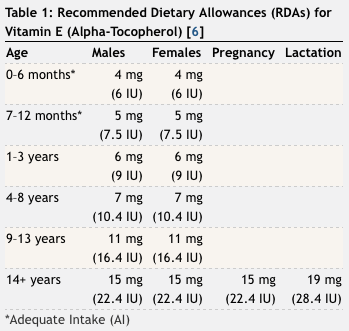by
Stepy —
September 17, 2014
- Despite conflicting reports about the need for dietary vitamin E, a new study shows that adequate levels of this nutrient are especially essential for the very young, the elderly, and woman who are or may become pregnant.
- A lifelong intake of vitamin E is also important, the research team said, but it is difficult to obtain through diet alone. It is estimated that a very small portion of Americans get enough vitamin E in their diet.
- “Meanwhile, some critics have raised unnecessary alarms about excessive vitamin E intake while in fact the diet of most people is insufficient,” said Maret Traber, a professor in the College of Public Health and Human Sciences at Oregon State University, principal investigator with the Linus Pauling Institute and national expert on vitamin E.
- “Many people believe that vitamin E deficiency never happens,” Traber said. “That isn’t true. It happens with an alarming frequency both in the United States and around the world. But some of the results of inadequate intake are less obvious, such as its impact on things like nervous system and brain development, or general resistance to infection,” Traber added.
- Some of the foods that are great sources of vitamin E are spinach, almonds, sunflower seeds, avocados, olive oil, broccoli, and squash. Research shows that people who are highly motivated to eat healthy almost get enough vitamin E, but broader surveys show that 93 percent of men and 96 percent of women do not consume enough. The National Institutes of Health recommends 15 mg of vitamin E per day for adults.
- In a review of multiple studies, Traber and the team outlined some of their findings:
- • Inadequate vitamin E is associated with increased infection, anemia, stunting of growth and poor outcomes during pregnancy for both the infant and mother.
• Overt deficiency, especially in children, can cause neurological disorders, muscle deterioration, and even cardiomyopathy.
• Studies with experimental animals indicate that vitamin E is critically important to the early development of the nervous system in embryos, in part because it protects the function of omega-3 fatty acids, especially DHA, which is important for brain health. The most sensitive organs include the head, eye and brain.
• One study showed that higher vitamin E concentrations at birth were associated with improved cognitive function in two-year-old children.
• Findings about diseases that are increasing in the developed world, such as non-alcoholic fatty liver disease and diabetes, suggest that obesity does not necessarily reflect adequate micronutrient intake.
• Measures of circulating vitamin E levels in the blood often rise with age as lipid levels also increase, but do not prove an adequate delivery of vitamin E to tissues and organs.
• Vitamin E supplements do not seem to prevent Alzheimer’s disease occurrence, but have shown benefit in slowing its progression.
• A report in elderly humans showed that a lifelong dietary pattern that resulted in higher levels of vitamins B,C, D and E were associated with a larger brain size and higher cognitive function.
• Vitamin E protects critical fatty acids such as DHA throughout life, and one study showed that people in the top quartile of DHA concentrations had a 47 percent reduction in the risk of developing all-cause dementia.
- “It’s important all of your life, but the most compelling evidence about vitamin E is about a 1000-day window that begins at conception,” Traber said. “Vitamin E is critical to neurologic and brain development that can only happen during that period. It’s not something you can make up for later,” she added.
- Traber recommends a vitamin E supplement too meet the recommended amounts for vitamin E intake. She also adds that vitamin E is particularly important for children through about the age of two, women who are pregnant, nursing, or may become pregnant, and the elderly.
- The recommended daily allowances from the National Institutes of Health for vitamin E are as follows:

- AS ALWAYS: Check with your health practitioner before you change your diet. These organic foods are not meant to replace any treatment or drugs you are taking.



















